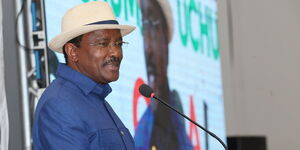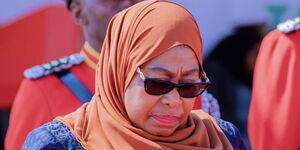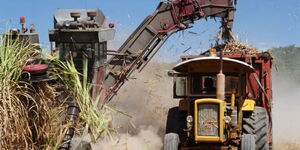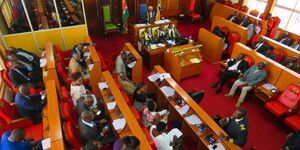The government has announced a plan to address the infestation of rats and snails in irrigation canals, which has become a significant problem for farmers.
During a speech at the Mwea Irrigation Scheme on Monday, November 25, Water and Irrigation Cabinet Secretary Eric Mugaa outlined these plans to eliminate the issue.
Mugaa pointed out that the presence of these pests has severely impacted rice production in the area, leading to a decline in the overall quality of the crop.
“During my visit here today, we have noted the challenges facing the Mwea Irrigation Scheme. There is a challenge of infestation of golden apple snails and rats in our irrigation schemes. This has affected the crop of production,” he noted.
“To deal with this issue, I have reached out to my colleague in the Ministry of Agriculture, Andrew Karanja. We have decided to form an interministerial taskforce to handle this problem,” Mugaa added.
Mugaa added that the two ministries will work alongside the county government of Kirinyaga to combat the infestation.
“I have also been in discussion with the area governor, Anne Waiguru. So it will be a team made up of the water and agriculture ministries as well as the county because this is our project and it has to be all-inclusive to bring Kenyans together,” the CS informed.
In the short term, Mugaa stated that the team will employ biological methods to tackle the problem as they develop advanced solutions in the long term.
“For now, we are looking at biological controls. We will introduce small fish, such as catfish, to deal with the snails and traps for the rats. However, I must say that the rat traps will not be sustainable in the long term because of the high number of rats,” he noted.
Mugaa acknowledged that the crisis was a novel occurrence in the irrigation scheme. He added that the task force would refer to what other irrigation schemes have done to properly address the issue.
“This issue is a foreign thing that has come up recently. Once the task force is formally constructed, they will look into what other irrigation schemes have done to deal with rats and snails and apply it in their work at Mwea,” informed Mugaa.
At the same time, Mugaa reiterated the ministry’s commitment to increase the output of the Mwea irrigation scheme and expand its ground cover.
“Currently, the Mwea irrigation scheme produces approximately 150,000 metric tonnes of rice in a single season. The finalisation of the construction of Thiba Dam in 2023 proved to be a game changer as it increased the water irrigation capacity of Mwea. Consequently, we have advised farmers to plant rice in double seasons to double the output to 300,000 metric tonnes. As a government, we have a target of producing 900,000 metric tonnes,” he affirmed.
"We are looking to increase the total area under production in the scheme to 35,000 acres. The current deficit in this regard is 5,000 acres. Plans are underway to develop the Mutithi area in the scheme, which covers 4,400 acres, so as to bring us closer to our target," Mugaa asserted.












